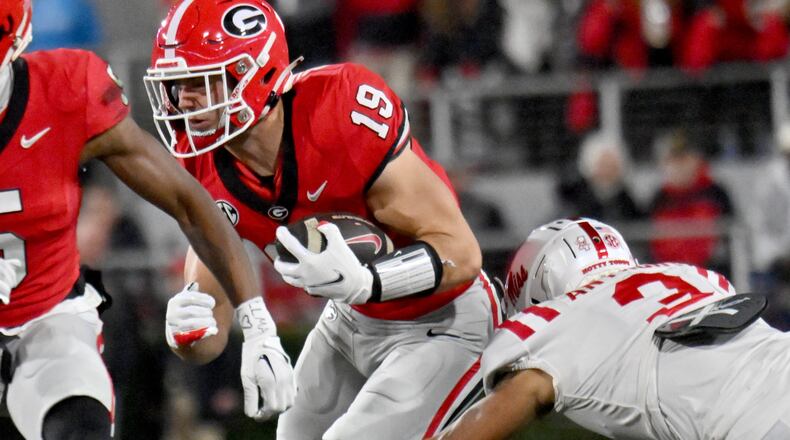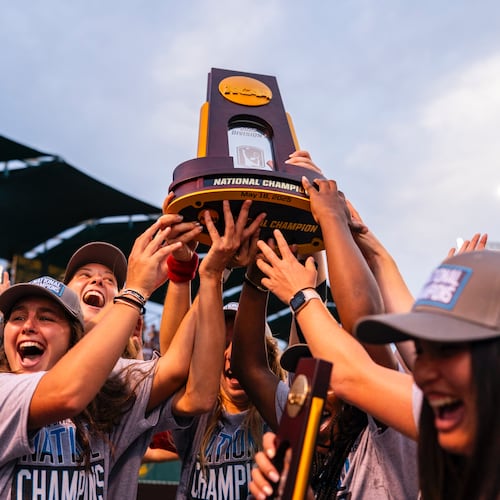ATHENS – This just in: Brock Bowers feels pain.
That notion had been somewhat under debate since Georgia’s star tight end returned to competition a mere 26 days after undergoing TightRope surgery to repair a high-ankle sprain.
Long known as one of the most troublesome and painful injuries in football, Bowers’ suffered one in his lower right leg on Oct 14 against Vanderbilt in Nashville, Tenn. He underwent the surgery -- which requires two holes to be drilled through the fibula and tibia bones -- two days later in Birmingham, Ala.
Then he rehabbed, then he practiced, then he played, then he caught a touchdown pass.
But between all that, we learned Tuesday, there was a lot of pain. Bowers shared that after the Bulldogs completed their second practice of the week for Saturday’s game against Tennessee in Knoxville.
Credit: HYOSUB SHIN / AJC
Credit: HYOSUB SHIN / AJC
Pain, Bowers revealed, pretty much has been his companion since first incurring the injury. But it was particularly acute this past Saturday when Bowers’ made his first post-surgery reception. It came on a short hitch pattern on the line of scrimmage 3:20 into the second quarter. Quarterback Carson Beck hit Bowers right in the numbers with the quick-release toss, then Ole Miss safety Daijahn Anthony hit Bowers directly on that right ankle.
Bowers, as he always seems to do, stayed up and drove on down the field another seven yards before defensive tackle Zxavian Harris joined the fray and finally wrestled him to the ground.
“It was a little reassuring, but it also didn’t feel great in the moment,” Bowers said Tuesday night. “It was uncomfortable. But it just kind of gave me that extra confidence for the rest of the game to know I could make those cuts and jump around on it.”
Bowers “jumped around” on that right leg for 43 snaps on Saturday. That was only slightly less than he played before the injury. Bowers would finish with three catches for 34 yards and hauled in an 8-yard TD catch early in the fourth quarter. The 25th career touchdown reception of Bowers’ career officially shut him down for the game as the Bulldogs led No. 9 Ole Miss 45-14 at that point early in the fourth quarter.
It ended as another record-setting night for Bowers. As far as anyone can tell, nobody in the SEC has made it back faster from TightRope surgery than Bowers. Tua Tagovailoa played 28 days after undergoing the procedure at Alabama in 2019.
As competitive as Bowers is, beating Tagovailoa’s record back to the field was not his motivation.
“He wanted to get back, but it never was a rush,” Georgia coach Kirby Smart said Tuesday. “You don’t rush somebody back, especially somebody like that. You have markers to hit, and once you hit a marker, you go to the next marker. Once you hit all the markers, then it becomes, ‘are you capable of playing at a high-enough level to contribute to the team?’ So, it was never about the number of days. It was about the markers.”
Just getting himself in position to think about coming back as quickly as he did required quick thinking and fast action. His surgery was performed on Monday by Dr. Norman Waldrop of Andrew Sports Medicine in Birmingham, Ala. The process to return to the field began the very next day.
Smart said there was a faction of advisers in Bowers’ considerable management team that felt the tight end should slow down the recovery process and possibly even consider shutting down for the rest of the season. Bowers said he never considered it.
“It never really crossed my mind,” he said. “I just always wanted to come back for the team and all the guys in the locker room. We just care so much about each other. I just wanted to come back and help the team.”
While there were no discussions or updates given to the team, Bowers’ teammates quickly took notice of the developing situation. On Nov. 1, when the Bulldogs were in the throes of preparations for a game against Missouri, Bowers quietly came out to Woodruff Practice Fields and began running cross-field sprints at the far end under the supervision of sports medicine director Ron Courson. By late week, Bowers was adding in cuts and decelerations.
“We’re in practice, we’re doing a period and all the sudden there goes Brock, sprinting across the field,” guard Tate Ratledge said with a laugh. “You’re thinking, OK, he shouldn’t be doing that yet. But there he is.”
Credit: Sarah K. Spencer/AJC
The quick response wasn’t about playing in Sanford Stadium last Saturday either. Though Ole Miss represented the final home game of the season, Bowers said he wasn’t looking at it like a finish line to cross.
“I wasn’t totally sure at all in the whole week leading up to it,” Bowers said. “I was kind of unsure if they’d let me go or they were going to keep me out. I mean, I wanted to play, obviously. I ended up feeling pretty good and was able to go, so I was pretty happy about it.”
Bowers will be back this weekend in Knoxville, too. Conceivably, Bowers is going to be better than he was last week. While he continues to practice daily with the Bulldogs, his commitment to recovery remains foremost on the checklist.
Every day begins with an early-morning trip to the Butts-Mehre training room for physical therapy and rehabilitation work. He’s among the first at the facility for afternoon practices because going on the field requires stretching and numerous flexibility exercises. Then he has to get “spatted up” with tape in a very specific way.
Post-practice means cutting off the tape, icing and other forms of recovery and maintenance.
“I’m feeling pretty good,” Bowers said Tuesday. “I was a little sore after the game, but that was to be expected just having not played for three or four weeks or whatever it was. I’m excited to go on the road to Neyland. It’s an exciting environment to play in. I’m just excited.”
Not that Bowers was competing with anybody, but it took Amarius Mims into a ninth week to get back from TightRope surgery last Saturday. Lawson Luckie took eight weeks from the middle of preseason workouts. James Cook and Arian Smith were able to take even more time than that due to off-season recoveries.
Bowers took just 26 days. He insisted being the quickest ever back to the field was not his motivation.
“I wasn’t paying any attention to all that,” Bowers said. “I was just reaching benchmarks and whenever I could play, I could play. It ended up being last week.”
About the Author
Keep Reading
The Latest
Featured





